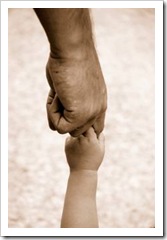When we talk about kids’ self esteem, we need to remember that a big part of it is instilled by parents, teachers and other important people in their life, called “socializing agents”. What these people say and do is the most important in the eyes of the kids who look up to them.
Believe it or not, kids believe everything you tell them.
A while ago, I went with friends to the wholesale market. Sally brought her 4-year-old son, Ethan. The wholesale market is a very noisy place and many forklifts rush from one side to another. The drivers drive them backwards as if this is the normal way of driving and we were very careful around them.
When we had bought everything, we stood in the shade to divide the boxes among us and Ethan climbed on one of the wooden pallets lying on the ground near us. In a jokingly way, Sally said, “Ethan, be careful that the guy with the forklift doesn’t pick you up with the pallet” and Ethan immediately came off the pallet.
 We were standing there for about an hour and Ethan, who had no interest in us dividing and talking about fruits and vegetables, went to play on the side on another wooden pallet. He was deep in his play when a forklift rushed next to us to the other side of the market. Ethan screamed in horror and rushed to his mother for comfort. He looked terrified, closed his eyes tightly and did not want to let go of her.
We were standing there for about an hour and Ethan, who had no interest in us dividing and talking about fruits and vegetables, went to play on the side on another wooden pallet. He was deep in his play when a forklift rushed next to us to the other side of the market. Ethan screamed in horror and rushed to his mother for comfort. He looked terrified, closed his eyes tightly and did not want to let go of her.
“Ethan, what happened?” she asked and he kept crying and said nothing.
“Ethan, look at me and tell me what happened”, she said and tried to make him look at her.
We were all scared that we had been so busy with ourselves that we had not noticed that something had happened.
It took Ethan more than 5 minutes to relax until he finally said, “The guy with the forklift came to pick me up with the pallet”.
Ethan was an innocent example of kids believing everything you tell them. Sally was an example of an innocent mother who never meant to harm anyone, yet created fear in her son’s mind, which had not been there before.
“Oh, my goodness”, said Sally, relieved, “He wouldn’t do that”.
When things like this happen too often, kids lose one of the ingredients of their self esteem, the trust in their socializing agents. In Ethan’s mind, just like in all kids’ minds who find their parents’ words cannot be trusted, popped the question “Then why did you say he would?”
Fortune telling
 Many times, trust is jeopardized when parents play fortune tellers. When they predict that something is going to happen and it does not happen (that way). When you say something that is later shown to be incorrect, your kids will ask themselves this horrible, doubt-creating, trust-eroding question “Why did they say that?”
Many times, trust is jeopardized when parents play fortune tellers. When they predict that something is going to happen and it does not happen (that way). When you say something that is later shown to be incorrect, your kids will ask themselves this horrible, doubt-creating, trust-eroding question “Why did they say that?”
Unfortunately, parents use fortune telling as a way to make their kids choose a different approach or way of behaving and without the real intention of telling what the future holds. Most of the time, they mean “It could happen”, but the kids do not hear it as an option. They see it as absolute truth, because kids interpret things literally.
Here is a list of phrases parents use to manipulate kids’ behavior, which risk losing their trust once things turn out differently:
- “You won’t be able to (or you can’t) do this”, when you actually mean, “It’s OK if you need help and I am here to help you if you need any help”
- “You’re going to fall!” or “You’re going to get hurt”, when you actually mean, “I’m worried you might fall, so please be careful”.
- “You’ll regret this”, when you actually mean, “I’m afraid this may have a bad ending and I suggest that you make a different choice”.
- “You’re going to hit someone with this”, when you want to say, “Be careful, this is dangerous”.
- “Just wait. Go to school without your homework and your teacher will take care of you already”, when you actually mean, “You should take into consideration that your teacher may punish for not doing your homework”.
 Remember, your language greatly influences your kids’ self esteem and they need to trust the people who introduce the world to them in such a way that they will be confident that what you say is really going to happen.
Remember, your language greatly influences your kids’ self esteem and they need to trust the people who introduce the world to them in such a way that they will be confident that what you say is really going to happen.
When you predict the future, use the words: might, could happen, option, possibility, could be, you should consider that, it is a risk. What you say is more accurate this way. If what you say happens, it builds your kids’ trust in you, but if it does not happen, it does not destroy it.
Join me later for the next chapters of self esteem mini course, exploring the language we use with our kids and how words can highly influence what they think about themselves. In the next chapters, I will discuss phrases and language that can easily diminish kids’ self esteem.
Until next time, let’s have a toast.
To a happy year of parenting!
Ronit
This post is part of the series Self Esteem Mini-Course:
- What Is Self Esteem?
- How School Promotes Low Self Esteem
- Beliefs and Where They Come From
- Social Identity
- Service Your Self-Esteem
- Your Self-Esteem Checklist
- How to Get Rid of Doubts
- Assertiveness and Self Esteem
- How to Be Assertive
- Beliefs of Assertive People
- Ronit Baras’ Success Experience Theory
- Ms Self Esteem has an Identity Crisis
- 13 Useful Conflict Resolution Steps You Need to Know
- Watch Your language or Lose Your Kids’ Trust
- War Between Two Minds
- What if
- What do I Think?
- Awareness is Half the Solution
- Damaging Kids’ Self Esteem
- Boosting Kids’ Self Esteem











